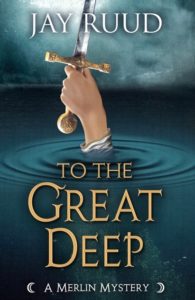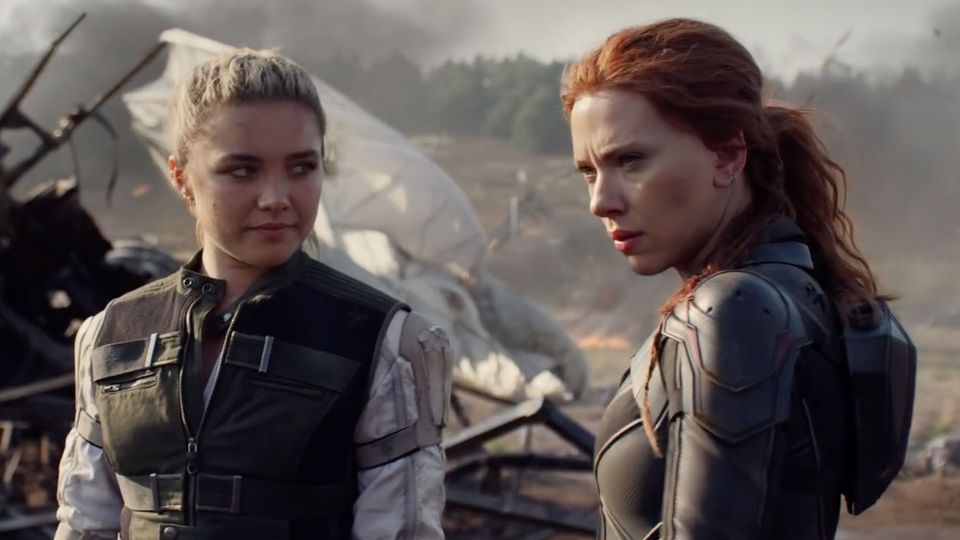Black Widow
Cate Shortland (2021)
Facts for You:
Where to Watch: Disney+ (where it will cost you $29.99[!])
Length: 2 hours 13 minutes
Names You Might Know: Scarlett Johansson. Florence Pugh, David Harbour, Rachel Weisz
Language: English
Rating: PG13 (for violence, some language)
He Said: Black Widow is finally here, some 14 months after its original planned release. And the COVID-delayed 24th film in the Marvel Cinematic Universe has made a splash in the new normal of the pandemically challenged movie-watching universe, garnering $263 million worldwide and $60 million on Disney+ in its first weekend. But unless you’re one of those 13-year-old boys who’s seen the other 23 MCU films a dozen times each, you may be a bit confused at where we find our protagonist Natasha Romanoff, a.k.a. “Black Widow” (Scarlett Johansson) as the story begins.
Just FYI for those who need it—which is anybody except those aforementioned 13-year old boys—this film takes place chronologically immediately after 2016’s Captain America: Civil War, when Black Widow, having been on the side of Iron Man against those Avengers loyal to Captain America, allowed Captain America to escape capture and so became a fugitive herself; and immediately before 2015’s Avengers: Age of Ultron, where she is reunited with the Avengers in their battle against Ultron. And, of course, the film precedes 2019’s Avengers: Endgame, in which Natasha Romanoff dies.
A planned film featuring Black Widow has apparently been in the works since 2004, and she first appeared in a minor role in 2010’s Iron Man 2. Her appearance in several other MCU films in small roles has always seemed a strange waste of a star of Scarlett Johansson’s magnitude, but this film finally made it into the MCU chute in 2019, with a script by Eric Pearson (Thor: Ragnarök) from a story by Jac Schaeffer (The Hustle) and Ned Benson (The Disappearance of Eleanor Rigby), and directed by Cate Shortland (known mainly for directing TV series, like SMILF). Neither Johansson nor Shortland was interested in making a simple “origin” film, which may explain the in medias res feeling of the film’s early stages.
But the film in fact opens with a brief “origin story”: a suburban Ohio home with a mother Melina (Rachel Weisz) who explains fireflies to her two young daughters, and a father Alexei (David Harbour, currently also to be seen in Soderbergh’s No Sudden Move), who comes home from work one day and announces to the family that they’ll be going on an “adventure.” They jump in the car, pursued by the police, drive to the airport where Melina takes off in a small jet with Alexei hanging on the wing firing at police vehicles. Next, we see them landing in Cuba, and speaking Russian to a General Dreykov (Ray Winstone). Before you know it, the two girls are rendered unconscious by hypodermic needles to the neck and are whisked away to a place that turns out to be a training school for assassins.
What we have here is an expansion on a brief revelation Natasha had made in Age of Ultron, regarding the program that had turned her into the skilled fighter she became—a program called the “Red Room” that brainwashed her and subjected her to numerous mortifications as a child, including a forced hysterectomy. This is the world we transition into, 21 years after the opening sequence. Natasha, having escaped to the West and now an Avenger, believes she has killed Dreykov and so shut down the Red Room some years before when, as an agent of S.H.I.E.L.D., she bombed his office in Budapest. But her younger sister Yelena Belova (Florence Pugh of Little Women), once the Red Room’s greatest child assassin, contacts her and convinces her that Dreykov is still alive and the Red Room is still churning out brainwashed female assassins. The bulk of the movie involves the hunting down and destroying of that fortress.
The movie is full of action scenes and climactic CGI engendered scenes of mass destruction typical of MCU movies. But this film is truly not so much about these as it is about family relationships—about the bond between the two long estranged sisters and with their feigned parents Melena and Alexei. What makes a family? The film asks. A question that ultimately also applies to Natasha’s relationship with her fellow Avengers—her other estranged family. Wouldn’t you say that’s the point of the movie, Jones?
She Said: I think saying it’s the “point of the movie” goes a bit too far, as there were so many fight scenes—including the mandatory structural destruction scene toward the end—that I was able to plan my wardrobe for the first month of UCA classes during them alone. I’m pretty sure the point of any of these comic book super-hero movies is always the violence, destruction and action.
But I will give you that this question the movie is circling was its most engaging and valuable theme, and it made it mean more to me than some of these summer movies do. I liked the relationship scenes among the family members, particularly between Pugh and Johansson, the sisters. Pugh is particularly wry and appealing.
I wasn’t wrong when I said I didn’t want to see it, and at $29.99 to rent it for the two of us, the price was a bit steep to me. It could have been worse.
One way it could have been better would have been to get actual Russian actors to play some of the Russian roles. And with all their accents, I’m pretty sure they were mispronouncing their daughter Yelena’s name, but what do I know? I’m just a cranky old lady, trying to decide what dress to wear on the fourth day of Introduction to Poetry during all the crashes and punches and leaps and bounds of two body-armor clad Hollywood superstars.
He Said: Well, you’re right about Pugh —I think that she virtually stole the movie, even though Johansson was remarkably good. It’s certain that the film is setting up Yelena for a sequel. Johansson, of course, can’t be in a sequel since her character is actually dead, but there is a post-credits scene showing Yelena at Natasha’s grave that is a forerunner of things to come.
It’s too bad that you were so distracted during the action scenes, because you also seem to have missed the strong feminist undercurrent in the movie that focused on not just the sisters but on sisterhood—Yelena and Natasha striving to save the women Dreykov has kidnapped and brainwashed into human killing machines whose wills are completely subjugated to his own, and whom he considers nothing more than cogs in his dream of world domination. He even says at one point that he has built his power on the one resource the world has plenty of—girls. One of the most touching twists the plot takes is Natasha’s fervent efforts to save Dreykov’s brainwashed daughter, who is determined to kill her.
As for the action scenes, the final destructive scene of course fits the hackneyed MCU pattern, though it is undercut by Natasha’s concern with saving rather than destroying lives. The earlier fight scenes are really more reminiscent of a Jason Bourne movie, especially with the theme of the secret government training program for brainwashed assassins. And the villain seeking world domination, along with the backstory of Russian spies—looks a lot like a Bond movie. I’m going to go ahead and give this movie three Soderberghs and half a Hitchcock. So there, Jones!
She Said: Well, yes, this movie does illustrate how patriarchy and capitalism shore each other up, so you’ve talked me into a higher rating than I may originally have given it. I just can’t go full Soderbergh though: two Michael Bays and half a Soderbergh for sisterhood.
This Week’s We Watched It and So Should You
He Said: The Kominsky Method, season three
Hot Take: This acclaimed show returned for a third and final season on May 28, with Michael Douglas returning as aging drama coach Sandy Kominsky but unfortunately without his brilliant co-star Alan Arkin as his agent Norman Newlander. Arkin had never planned to be part of the series for more than two years, and so had to be written out of season three. To play off of, though, Douglas does have Paul Reiser as his daughter’s much-older boyfriend, and Kathleen Turner as his ex-wife who shows up to be near her daughter and help plan the wedding. This is a show that made its mark by depicting old people in Los Angeles, and finding humor in the uncomfortable and sometimes demeaning or undignified or, this season, tragic situations that come with age. But there are also triumphs. You’ll still like the Arkin-less final season, and don’t worry: Norman’s memory looms over all six episodes here.
NOW AVAILABLE

To the Great Deep, the sixth and final novel in my Merlin Mysteries series, is now available from the publisher, Encircle Publishing, at http://encirclepub.com/product/to-the-great-deep/
You can also order from Amazon (a Kindle edition is available) at https://www.amazon.com/Jay-Ruud/e/B001JS9L1Q?ref=sr_ntt_srch_lnk_1&qid=1594229242&sr=8-1
Here’s what the book is about:
When Sir Agravain leads a dozen knights to arrest Lancelot in the queen’s chamber, he kills them all in his own defense-all except the villainous Mordred, who pushes the king to make war on the escaped Lancelot, and to burn the queen for treason. On the morning of the queen’s execution, Lancelot leads an army of his supporters to scatter King Arthur’s knights and rescue Guinevere from the flames, leaving several of Arthur’s knights dead in their wake, including Sir Gawain’s favorite brother Gareth. Gawain, chief of what is left of the Round Table knights, insists that the king besiege Lancelot and Guinevere at the castle of Joyous Gard, goading Lancelot to come and fight him in single combat.
However, Merlin, examining the bodies on the battlefield, realizes that Gareth and three other knights were killed not by Lancelot’s mounted army but by someone on the ground who attacked them from behind during the melee. Once again it is up to Merlin and Gildas to find the real killer of Sir Gareth before Arthur’s reign is brought down completely by the warring knights, and by the machinations of Mordred, who has been left behind to rule in the king’s stead.

